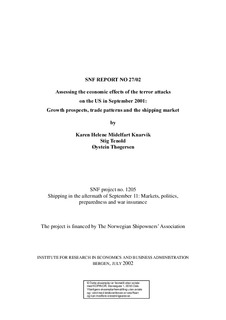| dc.contributor.author | Midelfart, Karen Helene | |
| dc.contributor.author | Tenold, Stig | |
| dc.contributor.author | Thøgersen, Øystein | |
| dc.date.accessioned | 2006-08-09T08:56:01Z | |
| dc.date.available | 2006-08-09T08:56:01Z | |
| dc.date.issued | 2002-07 | |
| dc.identifier.isbn | 82-491-0216-9 (trykt versjon) | |
| dc.identifier.issn | 0803-4036 | |
| dc.identifier.uri | http://hdl.handle.net/11250/164853 | |
| dc.description.abstract | Surveying available evidence at the current stage (April 2002), this report argues that the effects of the terror attacks in September 2001 on global business cycle conditions, trade and economic growth were essentially temporary. So far it is hard to see that the “global macroeconomic picture” would have been much different without the attacks. Looking at the shipping market, it turns out that the events of September 11 did not include any of the elements, which traditionally warrant a strong response in freight volumes or freight rates. The identified direct effects of the attacks on the shipping market are of minor importance compared to the more general patterns of development in the world economy. We still note – as a part of our pessimistic scenarios – that subsequent developments related to the attack may trigger a serious escalation of international tensions (politically and trade matters), which may hurt economic growth and trade significantly. | en |
| dc.format.extent | 318254 bytes | |
| dc.format.mimetype | application/pdf | |
| dc.language.iso | eng | en |
| dc.publisher | SNF | en |
| dc.relation.ispartofseries | Report | en |
| dc.relation.ispartofseries | 2002:27 | en |
| dc.title | Assessing the economic effects of the terror attacks on the US in September 2001: growth prospects, trade patterns and the shipping market | en |
| dc.type | Research report | en |
